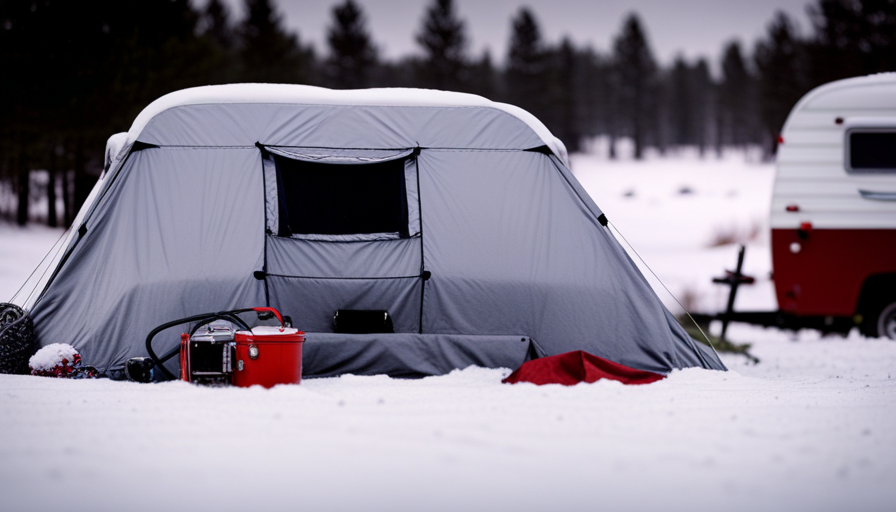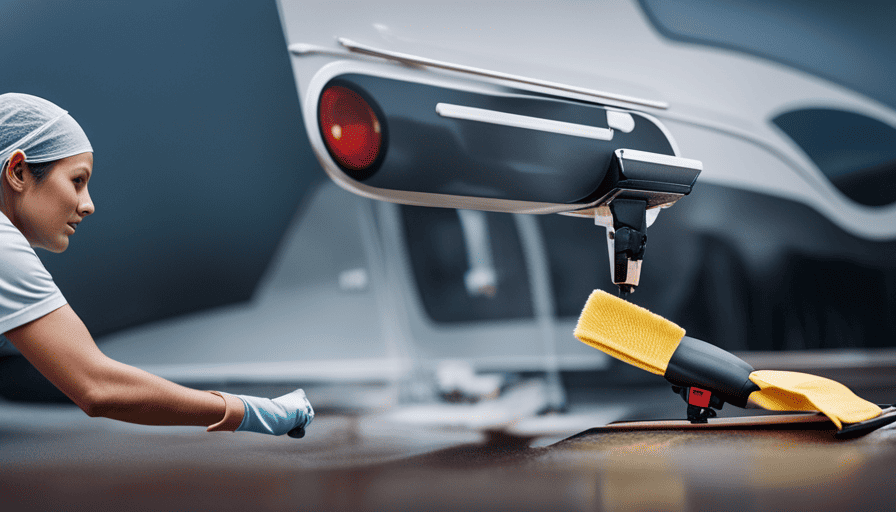Oh, the joys of camping! The crisp air, wide open spaces, and… flies? Yes, it seems that no matter where we go, those pesky insects always find a way into our campers. But fear not, fellow adventurers, for I am here to share with you the ways to get rid of those bothersome flies from your camper.
Now, you may be thinking, ‘Why should I bother with flies? They’re just harmless little insects.’ Well, my dear camper, let me assure you that flies are far from harmless. They can carry diseases, contaminate your food, and simply annoy the heck out of you.
But fret not, for I have gathered a plethora of tips and tricks to rid your camper of these winged nuisances. From keeping your camper clean and sealing any cracks, to using fly screens and natural repellents, I’ve got you covered.
And if all else fails, there’s always the option of seeking professional pest control assistance.
So, strap on your bug spray and get ready to reclaim your camper from those pesky flies. Let’s dive into the world of fly eradication and make your camping experience fly-free!
Key Takeaways
- Keep the camper clean and tidy to prevent flies.
- Seal cracks and openings to prevent flies from entering the camper.
- Use fly screens on windows and doors to keep flies out.
- Use natural fly repellents and traps to deter and eliminate flies.
Keep Your Camper Clean and Tidy
One of the best ways to keep flies out of your camper is by keeping it clean and tidy, creating an inviting space free from any potential food or garbage sources. To achieve this, it’s essential to follow some organizational tips for a clutter-free camper.
Start by decluttering and organizing your belongings, making sure everything has a designated place. This will minimize potential hiding spots for flies and make it easier to keep your camper clean.
Another important aspect is using eco-friendly cleaning products in your camper. Traditional cleaning products often contain harmful chemicals that can be toxic to both humans and the environment. By opting for eco-friendly alternatives, you not only reduce your exposure to these harmful substances but also contribute to a healthier planet. Look for cleaning products that are labeled as biodegradable and free from harsh chemicals.
Incorporating these organizational tips and using eco-friendly cleaning products will not only help keep flies at bay but also create a more pleasant and sustainable living environment in your camper. With a clean and clutter-free space, you can relax and enjoy your time without constantly battling with pesky flies.
Now, let’s move on to the next step: sealing any cracks and openings to further prevent flies from entering your camper.
Seal any Cracks and Openings
To keep those pesky critters out, make sure to patch up any cracks or openings in your camper and seal them tight as a drum. Flies are experts at finding even the tiniest gaps to sneak through, so it’s crucial to identify and fix potential entry points for these annoying insects.
Here are some effective methods to keep flies out of your camper:
-
Inspect the exterior of your camper thoroughly. Look for any cracks or openings in the walls, windows, doors, and vents.
-
Seal any gaps using weatherstripping or caulk. This’ll create a barrier that flies can’t penetrate.
-
Pay attention to areas where different materials meet, such as where the walls meet the floor or where the windows meet the frame. These junctions are common hotspots for cracks and openings.
-
Don’t forget to check the roof and undercarriage for any gaps or loose fittings that flies can exploit.
By sealing cracks and openings, you can significantly reduce the chances of flies invading your camper. Now that you’ve fortified your camper, let’s move on to the next step: using fly screens on windows and doors.
Use Fly Screens on Windows and Doors
Make sure you’ve got your camper protected by using fly screens on the windows and doors, keeping those pesky critters at bay. Using fly screens in your camper offers numerous benefits.
Firstly, it prevents flies from entering your living space, ensuring a hygienic and comfortable environment. Flies can carry diseases and bacteria, so having a barrier in place is essential for your health and well-being.
Secondly, fly screens allow fresh air to circulate while keeping out unwanted insects. This is especially important during summer months when ventilation is crucial for a pleasant indoor experience.
When it comes to choosing fly screens for your camper, there are several options available. The most common types include mesh screens, magnetic screens, and retractable screens. Mesh screens are the traditional choice, providing a sturdy barrier against flies. Magnetic screens are easy to install and remove, making them convenient for campers. Retractable screens offer the flexibility of being able to roll them up or down as needed. Consider your specific needs and preferences when selecting the right type for your camper.
Now that you have your windows and doors protected, it’s time to address another effective method for getting rid of flies in your camper: setting up fly traps or sticky strips.
Set Up Fly Traps or Sticky Strips
Now that you’ve got your camper protected with fly screens, let’s tackle those pesky critters by setting up some effective fly traps or sticky strips. Flies can be a nuisance in confined spaces like a camper, but there are several alternatives to traditional fly traps that you can try.
One option is to make your own fly trap using simple household ingredients. For example, you can create a mixture of apple cider vinegar, dish soap, and water in a jar. The scent of the vinegar will attract the flies, and the dish soap will break the surface tension of the water, causing the flies to drown when they land on it. Another homemade option is to use a plastic bottle with a small hole cut in the side. Fill the bottom of the bottle with a mixture of sugar water and yeast, which will release carbon dioxide and attract the flies. Once inside, the flies will be unable to find their way out.
If you prefer a commercial solution, sticky strips are a convenient and effective option. These strips are coated with a sticky substance that flies get stuck to when they land on them. Simply hang the strips in areas where flies are commonly found, such as near windows or doors. They will attract and trap the flies, preventing them from buzzing around your camper.
Now that we’ve covered fly trap alternatives and DIY fly repellents, let’s move on to the next section where we’ll explore the use of natural fly repellents.
Use Natural Fly Repellents
Protect your camper from those pesky critters by using natural fly repellents that’ll have those bothersome insects buzzing away in no time. When it comes to keeping flies at bay, there are several effective natural alternatives to choose from.
Here are a few homemade fly repellent recipes that aren’t only safe for you and your family but also environmentally friendly:
-
Essential oil spray: Mix 10 drops of essential oils like eucalyptus, lavender, or peppermint with 1 cup of water. Spray this solution around your camper’s windows, doors, and other entry points to repel flies.
-
Apple cider vinegar trap: Fill a small bowl with apple cider vinegar and add a few drops of dish soap. The sweet scent of vinegar attracts flies, while the soap traps them when they land.
-
Basil and mint sachets: Place dried basil and mint leaves in small cloth sachets and hang them around your camper. The strong aroma of these herbs acts as a natural fly repellent.
-
Citrus fruit slices: Cut slices of lemon, lime, or orange and place them in areas where flies tend to gather. The strong scent of citrus acts as a deterrent.
By utilizing these natural fly repellents, you can create a fly-free environment inside your camper. However, it’s also crucial to eliminate standing water, as it serves as a breeding ground for flies. So, let’s move on to the next step and ensure there aren’t any water sources that may attract these pesky insects.
Eliminate Standing Water
To create a truly fly-free environment inside your camper and prevent those pesky critters from invading, one crucial step is to rid your surroundings of any standing water. Flies are attracted to water sources, as they need moisture to survive and breed. By eliminating standing water, you are taking away their breeding grounds and making your camper less appealing to these annoying insects.
Preventing water accumulation is key. Be sure to regularly inspect your camper for any areas where water may collect, such as leaky pipes, clogged drains, or damp areas. Fixing these issues promptly will help prevent flies from being attracted to your camper in the first place.
By practicing regular maintenance and keeping your camper dry, you are taking a proactive approach in keeping flies at bay. Remember to empty and clean any containers that may collect water, such as pet bowls, flower pots, or bird baths. Additionally, ensure that your camper’s gutters are clear of debris and functioning properly.
By eliminating standing water and practicing regular maintenance, you are significantly reducing the chances of flies invading your camper. In the next section, we will discuss another important step in creating a fly-free environment – keeping food and garbage securely covered to prevent attraction.
Keep Food and Garbage Securely Covered
Make sure you always keep food and garbage securely covered to prevent attracting flies and creating a fly-free environment inside your camper. Flies are attracted to food and garbage because they seek out organic matter for nutrition and breeding. By properly storing food, you can significantly reduce the chances of flies being attracted to your camper.
Store all food in sealed containers to prevent odors from escaping and attracting flies. It’s also important to regularly clean up any spills or crumbs that may have fallen onto surfaces or floors.
In addition to proper food storage, you may also consider utilizing fly repellent sprays or patches in the camper. These products contain ingredients that flies find unpleasant, deterring them from entering your living space. Fly repellent sprays can be applied to doorways and windows to create a barrier that flies are less likely to cross. Fly repellent patches can be placed strategically around the camper to provide ongoing protection.
By following these guidelines and taking the necessary precautions, you can create a fly-free environment inside your camper. In the next section, we’ll discuss the use of citronella candles or essential oils to further enhance fly prevention.
Use Citronella Candles or Essential Oils
To effectively keep flies away from your camper, it’s important to explore various methods. We’ve already discussed the significance of keeping food and garbage securely covered. Now, let’s delve into another effective strategy: using citronella candles or essential oils.
Citronella candles have long been used as a natural repellent for insects, including flies. However, if you’re looking for alternatives, essential oils can also be quite effective in deterring flies. Oils such as peppermint, eucalyptus, lemongrass, and lavender have been found to have insect-repellent properties. By using these oils in diffusers or creating homemade sprays, you can create a pleasant-smelling environment while keeping flies at bay.
Imagine sitting inside your camper, surrounded by the refreshing scent of lemongrass, as the gentle flicker of a citronella candle illuminates the space. The combination of these methods forms a formidable defense against flies, ensuring a fly-free experience.
However, it’s important to note that the effectiveness of essential oils may vary, and it’s advisable to conduct further research to find the most suitable options for your specific situation.
Now, let’s move on to the next strategy to combat flies: installing a bug zapper or electric fly swatter.
Install a Bug Zapper or Electric Fly Swatter
Imagine the satisfying crackle as the bug zapper claims its latest victim, providing a captivating light show while effortlessly eliminating pesky flies in your camper. When it comes to getting rid of flies, you may be torn between using an electric fly swatter or a bug zapper. Both options have their merits, but which one is more effective?
An electric fly swatter is a handheld device that delivers a lethal shock to any fly unfortunate enough to come into contact with it. It offers a hands-on approach to fly elimination and can be quite satisfying to use. However, its effectiveness is limited to the flies you can reach and strike. Additionally, it requires manual operation, which can be time-consuming and may not be practical for larger infestations.
On the other hand, a bug zapper uses ultraviolet light to attract flies and other flying insects. Once the insects come into contact with the electrified grid surrounding the light, they are zapped and eliminated. Bug zappers can cover a larger area than an electric fly swatter, making them more suitable for larger spaces like campers. However, they may not be as effective during the day when the sunlight can compete with the UV light.
To prevent flies from entering your camper in the first place, consider using screens on windows and doors, sealing any cracks or gaps, and keeping your camper clean and free of food debris. These preventive measures can significantly reduce the number of flies that find their way inside.
Both the electric fly swatter and bug zapper have their advantages and limitations. The choice between the two depends on the severity of the fly infestation and personal preference. However, if the problem persists or becomes overwhelming, it may be necessary to seek professional pest control assistance to ensure a fly-free camper experience.
Seek Professional Pest Control Assistance if Needed
If the fly infestation in your camper becomes overwhelming, it may be time to consider seeking professional pest control assistance. While there are several DIY methods for fly control that you can try, sometimes the situation may require expert intervention. Seeking professional advice is important because pest control experts have the knowledge and experience to effectively handle fly infestations.
When you contact a professional pest control service, they’ll first assess the severity of the infestation and identify the species of flies present. This information is crucial in determining the most appropriate treatment method. They may use a combination of chemical sprays, baits, and traps to eliminate the flies and prevent future infestations.
Professional pest control technicians are trained to identify potential breeding sites and entry points for flies. They can offer valuable advice on how to prevent future infestations by addressing these areas. Additionally, they may recommend specific hygiene practices and maintenance routines to keep your camper fly-free.
While seeking professional pest control assistance may come with a cost, it can save you time, effort, and frustration in the long run. Remember to choose a reputable pest control company with experience in dealing with fly infestations in campers. Their expertise will ensure effective and long-lasting results.
Frequently Asked Questions
How do flies get inside my camper in the first place?
Flies are like opportunistic hitchhikers, finding their way into campers through any open door or window. They’re drawn by the scent of food, garbage, or even pet waste. To prevent their entry, it’s crucial to keep all entrances sealed tightly, using screens or weather stripping. Regularly cleaning and disposing of waste and maintaining a clean environment will also discourage flies from entering your camper.
Can flies damage my camper or cause any health concerns?
Flies in campers can pose potential risks to both the camper and its occupants. These pests can carry diseases and contaminate food, leading to health concerns. Additionally, flies can cause damage by leaving feces and saliva on surfaces, which can deteriorate materials over time.
To mitigate these risks, it’s important to take preventive measures such as keeping doors and windows closed, using screens, and properly disposing of trash. Regular cleaning and eliminating sources of attraction can also help deter flies from entering the camper.
Are there any specific types of fly screens that work best for campers?
When it comes to choosing the right type of fly screens for campers, there are several options available. The effectiveness of different fly screens can vary depending on various factors such as the material used, mesh size, and installation method.
Common types include magnetic screens, roll-up screens, and adhesive screens. It’s important to consider the size and shape of your camper’s windows and doors when selecting the appropriate fly screens to ensure maximum effectiveness in keeping flies out.
What are some natural fly repellents that are safe to use around children and pets?
Natural fly repellents can be an effective and safe solution for keeping flies away from your camper. Certain essential oils, such as citronella, eucalyptus, and peppermint, have been found to repel flies due to their strong odors. These oils can be diluted and applied to surfaces or used in diffusers to create a fly-free environment.
However, it’s important to note that while natural repellents are generally safe, it’s always advisable to use them with caution around children and pets to avoid any potential adverse reactions.
How do bug zappers or electric fly swatters work to get rid of flies in a camper?
Bug zappers and electric fly swatters are effective tools for getting rid of flies in a camper. Electric fly swatters work by delivering a high voltage shock to the fly upon contact, instantly killing it. They are portable, easy to use, and don’t require any chemicals.
On the other hand, bug zappers use ultraviolet light to attract flies and other flying insects. When the insects come into contact with the electrified grid, they’re electrocuted and killed. However, bug zappers may not be suitable for camping as they require a power source and can be bulky to carry around.
Can Certain Camper Brands Help Prevent Fly Infestations?
When it comes to preventing fly infestations while camping, choosing the top camper brands to consider can make a big difference. Look for features like screened windows and doors, as well as pest-resistant materials, to keep flies at bay. Investing in a quality camper can help ensure a more enjoyable outdoor experience.
Can Getting Rid of Mice in My Camper Also Help Control the Fly Population?
Yes, eliminating mice in camper can also help control the fly population. Mice attract flies with their droppings and uneaten food, so getting rid of the mice can reduce the fly infestation. Sealing any entry points and keeping your camper clean can further help in controlling the fly population.
Conclusion
Well, it’s been quite the adventure trying to get rid of those pesky flies in my camper. I’ve followed all the steps, from keeping it clean and tidy to sealing up any cracks and openings. I even used fly screens on the windows and doors, and set up traps and sticky strips.
I’ve tried natural repellents, covered my food and garbage securely, and even used citronella candles and essential oils. And let’s not forget the bug zapper and electric fly swatter I installed. But, despite all my efforts, those flies just won’t quit. It’s frustrating, to say the least.
Maybe it’s time to call in the professionals for some pest control assistance. I’m tired of this battle, and I’m ready for a fly-free camper once and for all.



















